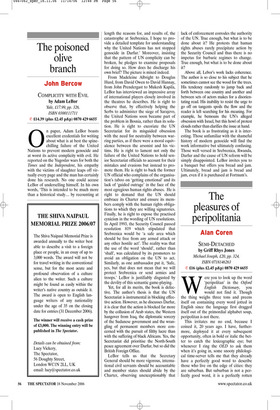The poisoned olive branch
John Bercow
COMPLICITY WITH EVIL by Adam LeBor Yale, £17.99, pp. 326, ISBN 0300111711 ✆ £14.39 (plus £2.45 p&p) 0870 429 6655 On paper, Adam LeBor boasts excellent credentials for writing about what is at best the spinechilling failure of the United Nations to prevent modern genocide and at worst its active complicity with evil. He reported on the Yugoslav wars for both the Times and the Independent, his empathy with the victims of slaughter leaps off virtually every page and the man has certainly done his research. No one could accuse LeBor of underselling himself. In his own words, ‘This is intended to be much more than a historical study... by recounting at length the reasons for, and results of, the catastrophe at Srebrenica, I hope to provide a detailed template for understanding why the United Nations has not stopped genocide in Darfur.’ Moreover, insisting that the pattern of UN complicity can be broken, he pledges to examine proposals for doing so. How does he discharge his own brief? The picture is mixed indeed.
From Madeleine Albright to Douglas Hurd, from David Owen to David Hannay, from John Prendergast to Mukesh Kapila, LeBor has interviewed an impressive array of international players closely involved in the theatres he describes. He is right to observe that, by effectively helping the Serbs to administer the siege of Sarajevo, the United Nations soon became part of the problem in Bosnia, rather than its solution. He is right to excoriate the UN Secretariat for its misguided obsession with the need for neutrality between warring parties, as if there were a moral equivalence between the arsonist and his victims. He is right to lament not only the failure of the United Nations to hold senior Secretariat officials to account for their mistakes and evasions but instead to promote them. He is right to back the former UN official who complains of the organisation’s taboo on ‘getting emotional’ and its lack of ‘guided outrage’ in the face of the most egregious human rights abuses. He is right to demand that the UN should embrace its Charter and ensure its members comply with the human rights obligations to which they are willing signatories. Finally, he is right to expose the practised cynicism in the wording of UN resolutions. In April 1993, the Security Council passed resolution 819 which stipulated that Srebrenica would be ‘a safe area which should be free from any armed attack or any other hostile act’. The reality was that the use of the word ‘should’, rather than ‘shall’, was calculated by its promoters to avoid an obligation on the UN to act. Similarly, as one ambassador put it, ‘Safe, yes, but that does not mean that we will protect Srebrenica or send armies and troops.’ LeBor is justifiably disgusted by the devilry of this semantic game-playing.
Yet, for all its merits, the book is defective. The author’s thesis is that the UN Secretariat is instrumental in blocking effective action. However, as he discusses Darfur, it is clear that the action is blocked far more by the collusion of Arab states, the Western hangover from Iraq, the diplomatic sorcery of the Sudanese government and the wrangling of permanent members more concerned with the pursuit of filthy lucre than with the suffering of black Africans. Yes, the Secretariat did prioritise the North-South peace agreement over Darfur, but so did the British Foreign Office.
LeBor tells us that the Secretary General should be more vigorous, international civil servants should be accountable and member states should abide by the Charter, observing unexceptionably that lack of enforcement corrodes the authority of the UN. True enough, but what is to be done about it? He protests that human rights abuses rarely precipitate action by the Security Council and thus there is no impetus for barbaric regimes to change. True enough, but what is to be done about it?
Above all, Lebor’s work lacks coherence. The author is so close to his subject that he sometimes cannot see the wood for the trees. His tendency randomly to jump back and forth between one country and another and between sets of actors makes for a disorientating read. His inability to resist the urge to go off on tangents spoils the flow and the reader is left searching for his meaning. For example, he bemoans the UN’s alleged obsession with Israel, but this howl of protest clouds rather than clarifies the issue at hand.
The book is as frustrating as it is interesting. Those unfamiliar with the shameful history of modern genocide will find the work informative but ultimately confusing. Those well versed in Srebrenica, Rwanda, Darfur and the cause of UN reform will be simply disappointed. LeBor invites you to a banquet but offers you bread and jam. Ultimately, bread and jam is bread and jam, even if it is purchased at Fortnum’s.


































































































 Previous page
Previous page